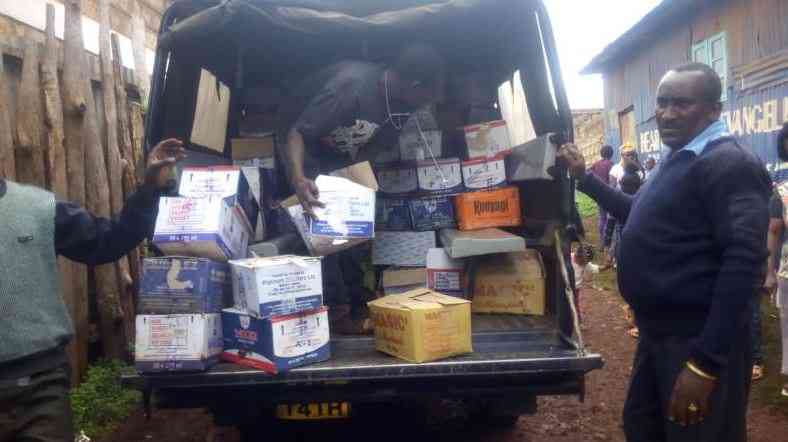Kenya’s manufacturing sector faces new pressure from proposed tax measures within the Finance Bill 2025, with alcoholic beverage producers warning that certain clauses could undermine their competitiveness and inadvertently fuel the illicit alcohol market.
The State aims to increase revenue through the bill. Industry players, including the Alcoholic Beverages Association of Kenya (ABAK) and Kenya Breweries Ltd (KBL), have voiced concerns over proposed changes to excise duty on undenatured extra neutral alcohol (ENA).
ENA is a primary raw material for spirits. The Bill proposes reducing the excise duty from Sh500 per litre to Sh250.
KBL, in its submission seen by The Standard, stated that while it appreciates the government’s shift to a volume-based excise regime from an Alcohol by Volume (ABV)-based system, the proposed rate remains high compared to neighbouring countries.
“The proposed excise rate for ENA is 5.6 times the Uganda rate,” KBL said. Uganda’s rate stands at Sh88.64 per litre, and Tanzania’s at Sh239.29 per litre. This disparity, KBL indicated, “reduces cash flow and makes local manufacturing in Kenya uncompetitive.”
Industry warnings
Such a price gap could also “reduce the incentive for unscrupulous individuals from smuggling ethanol into Kenya,” KBL added, noting this has “exacerbated the problem of illicit alcohol trade.”
A recent report by Euromonitor International, commissioned by ABAK, reinforces these industry warnings. The study estimates that ethanol smuggling alone accounts for 81,455 hectolitres of pure alcohol, representing seven per cent of Kenya’s illicit alcohol volume.
This illicit trade holds an estimated value of Sh23 billion, resulting in a reported fiscal loss of Sh9 billion for the government. The report indicates that illicit alcohol now comprises 60 per cent of the total alcohol market in Litres Alcohol Equivalent (LAE) terms, with its volume growing by 27 per cent since 2022.
Manufacturers have also raised concerns about a proposed clause (Section 8 (C)) seeking to cap the carry-over of tax losses or deficits to five years, from the current indefinite allowance. This measure, according to industry stakeholders, could particularly affect companies with significant capital expenditures. These companies often incur capital allowances that extend beyond five years.
KBL warned that the proposal “will impact companies with heavy capital expenditures that result in income tax deficits.”
It could also affect businesses that have restructured following historical losses but are now in a profit streak.
KBL stated that for such companies, “historical losses should be allowed indefinitely provided that no new losses are being accrued.”
The clause may also place Kenyan businesses at a competitive disadvantage, as Tanzania allows indefinite loss carry-forwards, and Uganda permits it for seven years.
Other clauses in the Finance Bill 2025 have drawn criticism from KBL.
A proposal to delete Section 15 (2)Z, which currently enables tax deductions for sports sponsorships, is seen as potentially leading to a decline in private sector funding for sports.
KBL noted this “goes against Kenya Kwanza’s Bottom-Up Economic Transformation Agenda (BETA) commitments on youth and sports development.” Separately, a proposed deletion of Section 59A (1B) of the Tax Procedures Act is raising concerns. This section currently prevents the Kenya Revenue Authority from demanding access to trade secrets or private customer data.
KBL stated this move conflicts with existing legal frameworks, including Article 31 (Right to Privacy) of the Constitution of Kenya (2010) and sections of the Data Protection Act, 2019.
This change “risks undermining investor confidence and international data transfer agreements if it weakens its data protection framework,” KBL warned.
Job losses
It could also deter innovation and investment and potentially lead businesses to relocate data operations, resulting in job losses.
Manufacturers are also seeking allowances for spirits processing and transit losses.
They argue that new measurement methods, such as mass flow meters, and natural evaporation during transit result in unavoidable volume variations. This leads to manufacturers paying excess taxes, KBL said.
They advocate for a one per cent spirits process and transit loss allowance on excisable raw materials, citing international practices in South Africa, Europe, the US and the UK.
The debates surrounding the Finance Bill highlight a broader economic tension.
While the banking sector reported robust profitability, with some top lenders showing a combined post-tax profit of Sh141 billion last financial year, other sectors like manufacturing indicate challenging conditions.
Industry players contend that without a conducive tax and regulatory environment, the competitiveness of key sectors could be eroded, potentially hindering the country’s overall economic recovery and job creation efforts.
By Brian Ngugi












